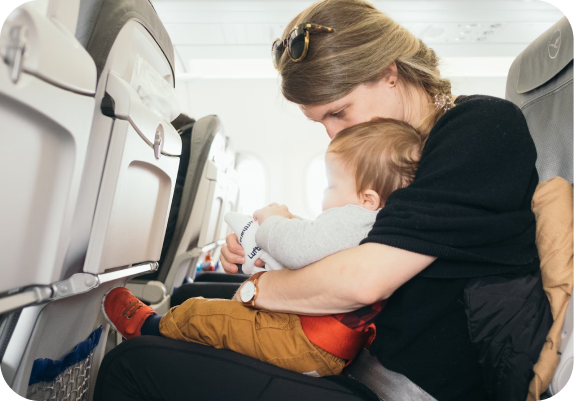NEXT UP
Complementary feeding in CMPA
Eating out at parties or restaurants can pose a challenge when you have a child with a food allergy.
When choosing a restaurant, look at the website in advance for allergen information. Many more restaurants are aware of food allergies and want to cater for your needs, however this might depend on where you live.
Alternatively, you could call ahead to ask questions about the menu and ingredients used. Avoiding the busiest mealtimes may help to give staff more time to check ingredients properly.
It is very important to be clear to restaurant staff about what your child needs to avoid. If you do not understand what the food item contains, or there is no information on it, then err on the side of caution and do not order it.
In self-service or buffet areas, be aware that cross-contamination between food allergens can occur.

Providing a safe environment for your baby at crèche, nursery or pre-school requires a bit of advanced planning. It is important to have good communication with the crèche, nursery or pre-school team in advance.
It’s a good idea to have an up to date, detailed treatment plan for the crèche, nursery, or pre-school team in the event of your child having an allergic reaction. Staff should be trained on how to administer any medications e.g., adrenaline (epinephrine) autoinjectors etc., that your child might require.
If the school provides meals, look at the menus and snack options and provide them with a list of suitable foods. Alternatively, pack food from home and teach your child not to share food or drinks with other children. Providing the school with safe treats for your child, for special occasions, ensures that they aren’t excluded. This is important for your child.
Traveling with your baby or young child with a CMPA also requires preparation and planning. If your child is on a hypoallergenic formula, make sure you bring enough with you for the entire trip, or check in advance that it is available at the destination.
It’s a good idea, if you are travelling abroad, to check in advance how to describe your child’s cow’s milk protein allergy in the local language. And if you are flying, speak to the airline well in advance, to inform them of your child’s food allergy and to make sure they can meet your child’s dietary needs, if that is needed. On board, make yourself known to the flight crew to ensure the correct meal is received. Alternatively, take suitable foods or snacks for the journey.
Always carry your child’s rescue medication e.g., antihistamines, adrenaline autoinjector with you. And make sure you have the telephone number of the local hospital or emergency services with you. If in doubt, consider self-catering options in case there are no safe places to eat out.

If your child is going on a playdate or visiting friends, it’s a good idea to inform the family in advance of your child’s cow’s milk protein allergy. Explain how severe it can be, what to do if your child has a negative reaction and what foods they need to avoid.
Also, inform the family of the foods which are allowed or safe, and how to recognise a reaction. It might be a good idea, depending on the family, to provide a supply of suitable snacks for your child.
Reading food labels is important to master when your child has a food allergy. Ingredients and manufacturing processes can change without warning, so try to read the label each time.
By law, food companies must label their products clearly if they contain milk/dairy. If a food item does not have a label, you have doubts about it, or you cannot read it, avoid giving your child that food.
Some food companies use precautionary allergen labels, for example “may contain milk” or “made in a factory with milk.”
In this case, especially if your child has had a severe reaction, avoidance of the food may be recommended. Discuss the safest approach with your dietitian.
Your baby’s doctor/GP may prescribe medications to treat the symptoms of your child's cow’s milk protein allergy. Antihistamines can provide relief from a minor allergic reaction.
If your child suffers from a severe reaction, the doctor/GP might prescribe an injectable form of adrenaline (epinephrine) in an auto-injector to treat anaphylaxis.
Always carry this with you when you are out of the house with your child. Also, check with your child’s doctor/GP on how to use it and what to expect once it has been used.